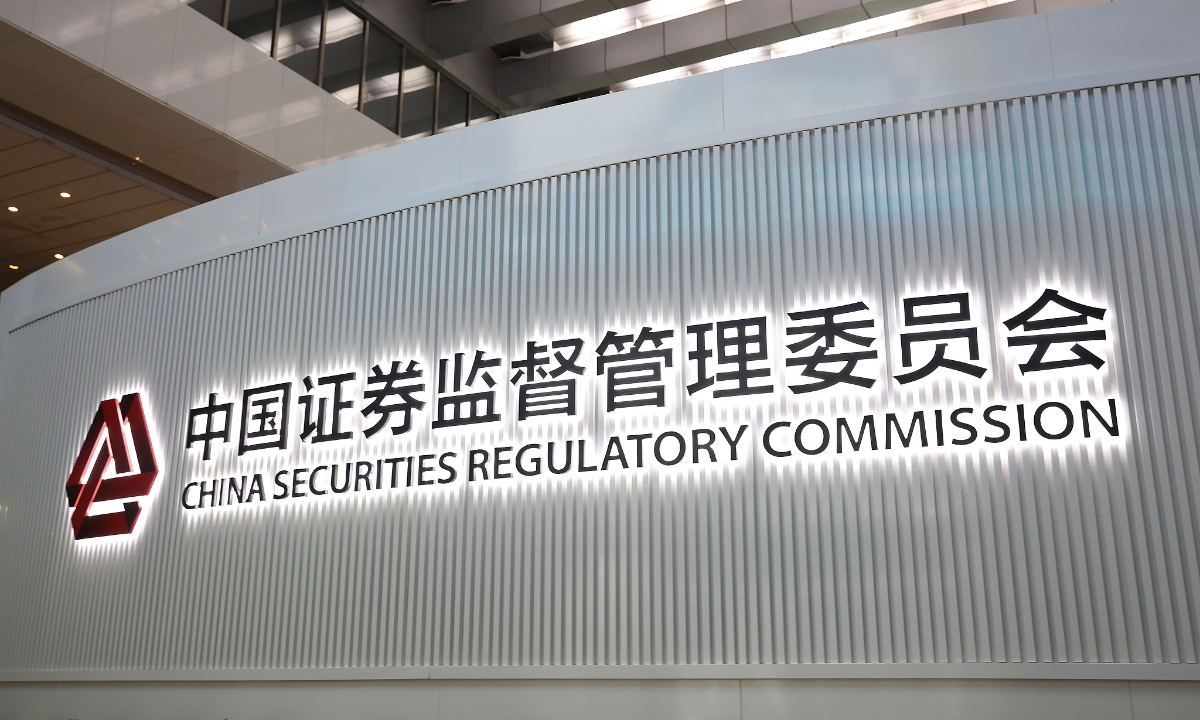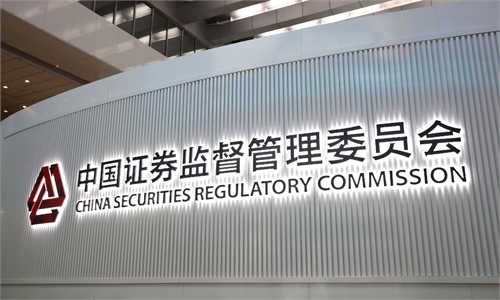Securities chief vows to safeguard stable operation of capital market to aid real economy
Move will support steady recovery of national economy

China Securities Regulatory Commission (CSRC) in Beijing Photo:VCG
China will fully safeguard the stable operation of the financial market, enhance monitoring of the trading of stocks and capital flows, and build up a risk assessment and early warning system, Yi Huiman, chairman of the China Securities Regulatory Commission (CSRC), said in an interview with the Xinhua News Agency published on Monday.
Yi vowed to improve the registration-based IPO system and the multi-level capital market system, raise the quality of listed companies, and advance high-level institutional opening-up.
Yi called for better mechanisms to give full play to market entities to perform their stabilizer role in the market by improving the countercyclical adjustment mechanism in the primary and secondary markets, and encouraging and guiding listed companies to repurchase their shares and shareholders to increase their holdings.
Chinese analysts said the remarks by Yi, which came after the Central Financial Work Conference, further clarified the regulator's stance on the capital market with a focus on serving the real economy, assisting high-quality development and fending off risks.
"The CSRC's measures for building a safe, regulated, transparent, vibrant and resilient capital market accord with the spirit of the Central Financial Work Conference, as the stable recovery of China's economy needs greater support of the financial sector at the moment," Xi Junyang, a professor at the Shanghai University of Finance and Economics, told the Global Times on Monday.
Finance is the lifeblood of the real economy, and serving the real economy is the fundamental mission of the financial sector. In 2023, financial regulators stepped up the capital market's support for the real economy and the stabilization of economic growth, Xi Junyang said, noting that the registration-based IPO system should be further advanced to build a dynamic capital market for high-quality growth.
In order to build a nation with a strong financial sector, the country should also continue to expand high-level opening up in the sector to increase its international competitiveness, Xi Junyang said.
More efforts will be spent on improving the quality of listed firms, according to Yi. In 2022, more than 5,000 listed companies achieved a total added value of more than 18.23 trillion yuan ($2.57 trillion), accounting for 15.1 percent of China's GDP, and their research & development (R&D) investment accounted for about half of the national R&D expenditure.
Pan Helin, joint director of the Research Center for Digital Economics and Financial Innovation affiliated with Zhejiang University's International Business School, told the Global Times on Monday that the remarks by the CSRC chairman signal the agency's will to strengthen supervision.
"Market stabilization measures by the CSRC will mainly come from stabilizing the market through strengthening supervision, and not in the form of raising stock prices," Pan said.
The Central Financial Work Conference, held in Beijing from October 30 to 31, stressed that the financial sector is the lifeblood of a nation's economy, and it set the goal of building up a strong financial sector in China. The meeting also called for fending off risks in the capital market.
Experts said the country's financial risks are under control and there will be no systemic risks. "By stressing efforts to forestall and defuse financial risks, the regulators aim to contain potential risks within only some financial institutions and their products so as to reduce the overall risks in the country's financial sector," Xi Junyang said.
Despite the downward pressure facing the Chinese economy and relatively weak performance of the Chinese stock market, a number of foreign financial institutions including Standard Chartered and HSBC have recently expressed confidence in the Chinese market, the China Securities Journal reported on Monday.
"China is the world's second-largest economy, but the weight of Chinese A-shares is less than 3 percent among global asset allocations. This means that there is vast scope for China's capital market," Helen Huang, managing director for China of asset management company Fidelity International, told the Global Times in an interview last month.
Chinese stocks closed lower on Monday, with the benchmark Shanghai Composite Index down 0.29 percent to 3,022.91 points. The Shenzhen Component Index closed 0.62 percent lower at 9,660.44 points.
With a perceived weakness of the US dollar, listed companies in China will have a good year in 2024 in terms of securing financing and development, Pan predicted.
"They need to focus on innovation and technology upgrading to bank on the bigger upgrading of the Chinese economy as well as improve their corporate governance to suit stiffer regulatory oversight," Pan said.



